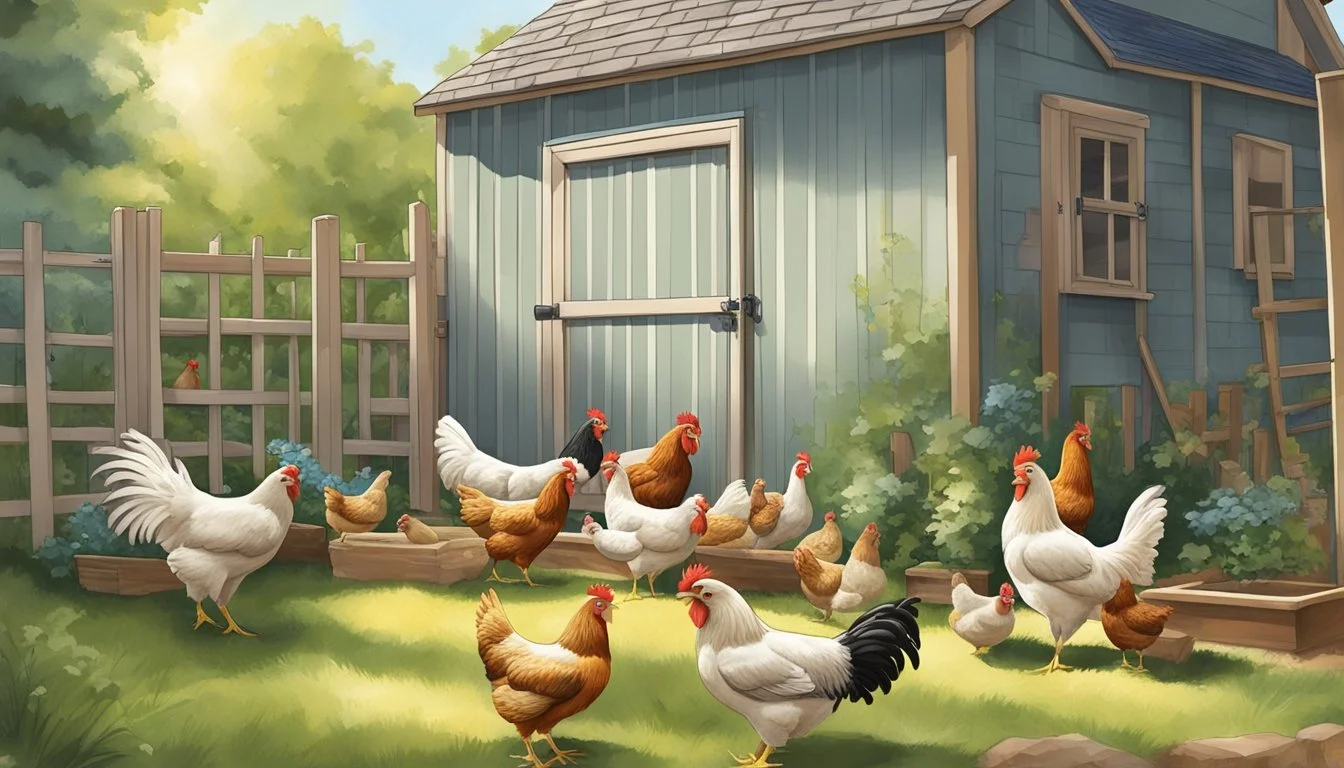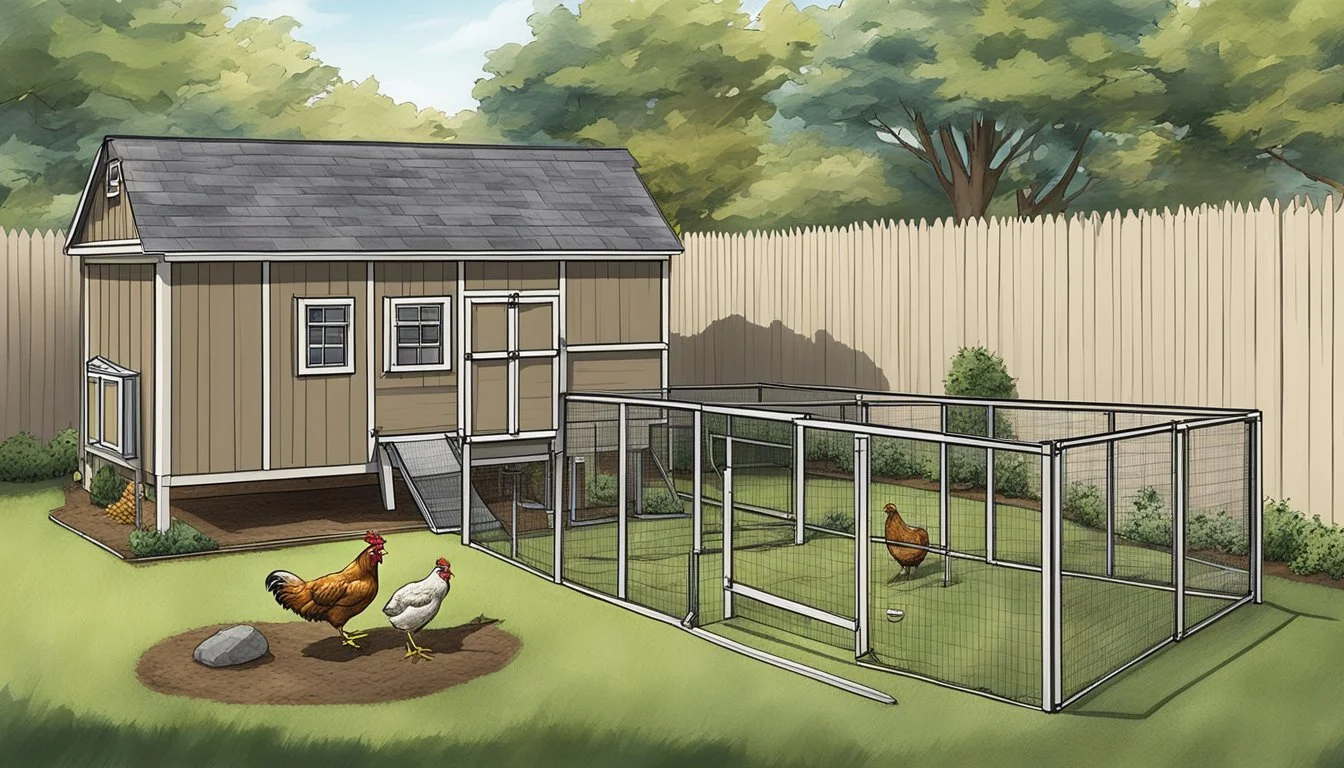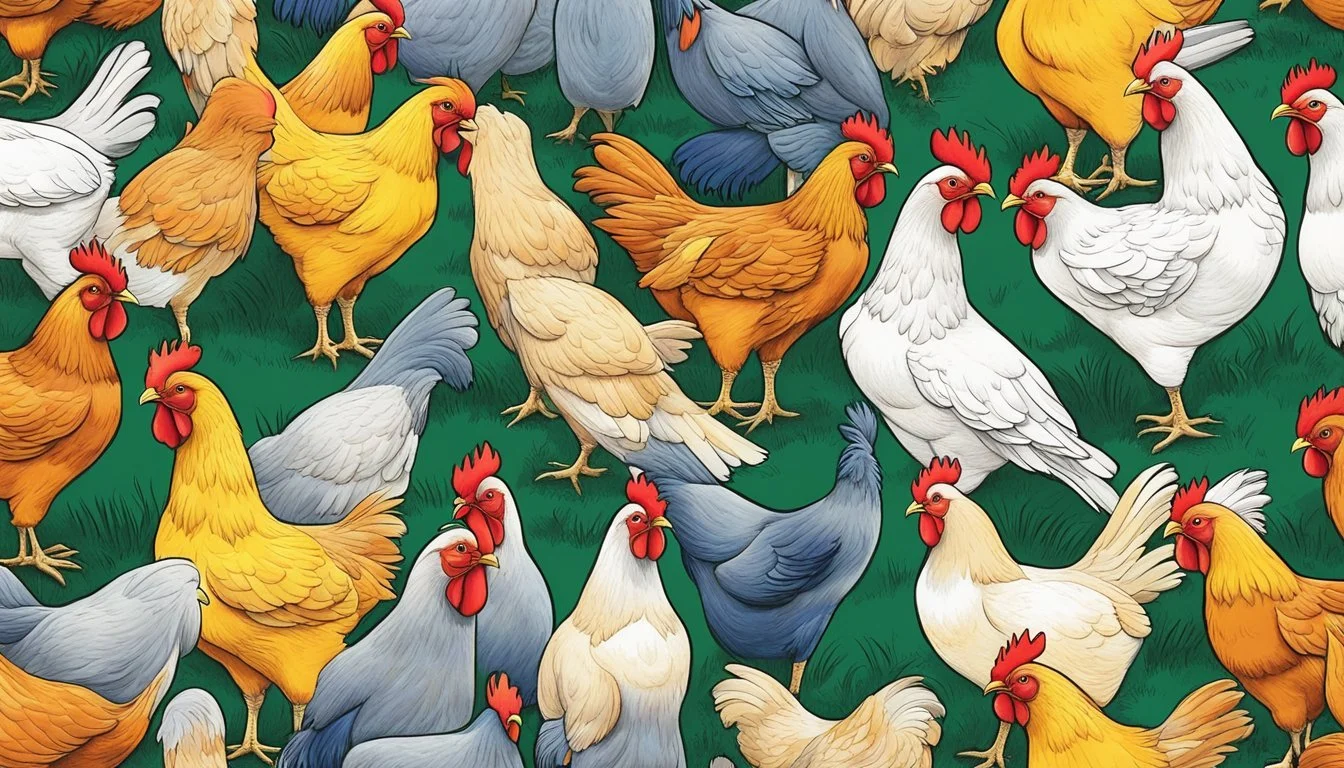Raising Backyard Chickens in Gaithersburg, MD
A Guide for Urban Poultry Enthusiasts
In Gaithersburg, Maryland, the trend of raising backyard chickens is part of an increasing movement towards local and sustainable food practices. The city caters to residents inclined to keep hens by permitting the activity within its limits, subject to specific guidelines and regulations to maintain harmony within the community. These regulations are a response to a growing interest in urban agriculture, and they reflect a balance between the freedoms of individual homeowners and the interests of the wider community.
Keeping chickens in one's backyard offers numerous benefits, including access to fresh eggs, natural pest control, and the joy of caring for animals. Gaithersburg's approach ensures that while residents can enjoy these benefits, they also adhere to rules that safeguard the well-being of the animals and the community. This includes obtaining a permit and keeping the chicken coop a requisite distance from neighboring homes, which addresses potential concerns related to noise, odor, and predators.
Those considering raising chickens in Gaithersburg must navigate these regulations carefully. For instance, the number of hens allowed is capped to prevent overcrowding and to minimize the impact on the surrounding area. Additionally, the city's stipulations regarding coop placement and the prohibition of roosters help reduce the chances of disturbances. Prospective chicken keepers should be well informed about these parameters to ensure a smooth and compliant integration of their poultry pursuits with urban life.
Understanding Local Regulations
When considering raising backyard chickens in Gaithersburg, MD, residents must navigate a series of local regulations to ensure compliance with zoning, lot line requirements, and permits. Adhering to these rules will pave the way for a lawful and community-friendly poultry raising experience.
Gaithersburg Zoning Ordinance
In Gaithersburg, the city mandates that individuals obtain a city-issued permit before keeping chickens. The local zoning ordinance may evolve over time, so it's critical for residents to contact city officials for the most up-to-date regulations regarding backyard poultry.
Montgomery County Requirements
The broader Montgomery County has its own set of regulations that augment Gaithersburg's rules. The county permits a maximum of eight hens, but no roosters, to minimize noise issues. Residents in Montgomery County must also respect the stipulated limits on coop placement to avoid disrupting neighbors.
Permits and Lot Line Restrictions
Permit requirements and lot line restrictions are key aspects of the regulatory framework. In Gaithersburg, coops must be placed a certain distance from neighboring homes, though exact figures should be confirmed with the city due to potential updates to the ordinances. Montgomery County's zoning ordinance requires backyard chicken coops to be at least 25 feet from lot lines and 100 feet from dwellings on adjacent lots. This condition is especially important for townhouse residents, as it may limit their ability to raise chickens.
By understanding and observing these local regulations, Gaithersburg residents can ensure that their backyard chicken endeavors are both legal and considerate of their surrounding community.
Choosing the Right Chicken Breed
When raising backyard chickens in Gaithersburg, MD, selecting the appropriate breed is crucial for meeting specific goals, whether for egg production, meat yield, or both. Specific breeds adapt better to the climate and backyard conditions of Maryland, each with distinct characteristics.
Egg Layers vs. Meat Breeds
Chickens are primarily categorized based on their principal utility: laying eggs or providing meat. Egg layers are breeds that are optimized to produce a high number of eggs over their lifespan. Meat breeds are typically larger and grow more quickly, making them suitable for meat production. Dual-purpose breeds serve both these needs, providing a moderate amount of eggs while also being adequate for meat.
Egg layers like the Leghorns are known for their prolific egg-laying abilities, often producing a high volume of white eggs.
In contrast, meat breeds do not have specific breeds that dominate the scene in Maryland but generally include larger and faster-growing chickens.
Dual-purpose breeds combine these traits and include chickens such as Plymouth Rocks and Orpingtons.
Popular Breeds in Maryland
Maryland's climate is a deciding factor when choosing the right chicken breed. Certain breeds are better suited to withstand local weather conditions and bring about the best results in terms of egg laying or meat production.
The Rhode Island Red is a resilient breed, with the ability to lay around 250 to 300 brown eggs per year.
Similarly, Plymouth Rock chickens are good layers of brown eggs and are also known for their hardiness in different climates.
Orpingtons are well-adapted for Maryland's temperatures, providing both meat and brown eggs. They are known for their friendly temperament and fluffy appearance.
In Gaithersburg, these breeds are not just practical but also compliant with local regulations regarding backyard chickens. Owners must consider zoning ordinances that regulate coop placements, ensuring that their chicken-keeping practices align with local laws.
Creating a Safe and Comfy Coop
A well-designed chicken coop offers protection and comfort, ensuring that chickens are healthy, secure, and productive. The following aspects are pivotal when crafting a backyard chicken coop in Gaithersburg, MD.
Coop Design and Size
The coop should provide a minimum of 4 square feet per chicken to ensure ample space for movement. Local regulations need to be considered, such as maintaining a distance of 25 feet from the lot line, and the coop should be designed to withstand diverse weather conditions in Maryland. Chicken coop plans should accommodate the flock size while allowing for future expansion if needed.
Dimensions: Calculate based on the number of chickens to house. Aim for spaciousness to prevent overcrowding.
Ventilation: Crucial for temperature control and air quality.
Insulation: Optimal for maintaining a steady temperature within the coop.
Essential Features of a Coop
A secure coop keeps predators out and chickens in, reducing the risk of harm. Proper fencing and secure locks are necessary to deter predators common in Gaithersburg. Inside the coop, nesting boxes and roosting bars provide chickens with a place to lay eggs and sleep.
Security: Locks, sturdy materials, and fencing against predators.
Nesting Boxes: One box for every 3-4 hens.
Roosting Bars: Placed above ground level to ensure chickens feel safe while sleeping.
Maintaining Cleanliness and Health
Cleanliness is vital for preventing diseases and maintaining a healthy flock. Easy access for cleanup is necessary. The coop should have removable trays and doors wide enough to sweep out used bedding. Proper bedding like straw or wood shavings must be kept dry and changed regularly.
Bedding: Absorbent materials like straw or wood shavings.
Cleaning Routine: Weekly removal of soiled bedding and waste.
Health Checks: Regular inspection for signs of pests or disease.
Feeding Your Flock
Feeding your flock properly is a cornerstone of healthy chicken raising. Gaithersburg, Maryland's backyard farmers can ensure their chickens thrive by adhering to a diet that provides all the necessary nutrients.
Types of Chicken Feed
There are several types of chicken feed available which are formulated for different stages of a chicken's life.
Starter Feed: High in protein, designed for chicks up to 6 weeks old.
Grower Feed: Moderately high in protein for developing pullets.
Layer Feed: Contains calcium to support eggshell strength for laying hens.
In addition, complementary feeds like scratch grains can be provided sparingly as a treat. Some farmers may opt for organic feed to avoid synthetic inputs. It's also common to include mealworms for an extra protein boost.
Feeding Schedule and Practices
Chickens require a consistent feeding schedule. They should be fed twice a day, morning and evening.
Chicks: They need continuous access to food due to their growth rate.
Adults: Portion control is vital to prevent obesity.
Utilize proper feeders that keep the feed dry and clean. A robust feeding routine integrates the following:
Limit treats to 10% of their diet.
Provide grit to help digestion.
Maintain a clean feeding area to prevent disease.
Providing Fresh Water
Water is just as crucial as food. Chickens need constant access to fresh water.
Waterers should be cleaned regularly to prevent algae and bacteria.
Place waterers in a shaded area during summer to keep water cool.
On cold days, ensure water is not frozen.
By following these specific feeding guidelines, your backyard chickens in Gaithersburg will be on a good path to a productive and healthy life.
Health and Wellness
Maintaining the health and wellness of backyard chickens is critical for ensuring a productive and disease-free flock in Gaithersburg, MD. Chicken owners should focus on preventive measures and be vigilant in identifying diseases, in addition to adhering to routine healthcare practices.
Preventing and Identifying Diseases
Proper sanitation and biosecurity are the first steps in preventing diseases in backyard poultry. Owners should routinely clean and disinfect coops and equipment to reduce the risk of infections. Pest control is equally important as parasites can spread diseases. Regular checks for signs of illness such as changes in behavior, appetite, or appearance are crucial for early disease identification.
Common Diseases to Watch For:
Respiratory illnesses (e.g., Avian Influenza)
Digestive disorders (e.g., Salmonellosis)
Parasitic infections (e.g., Mites and Lice)
Routine Healthcare Practices
Regular veterinary check-ups should be part of any backyard flock's healthcare regimen to ensure prompt vaccination and treatment if needed. Besides vaccinations, a daily healthcare routine should include:
Fresh water and nutritionally balanced feed
Monitoring for signs of distress or illness
Keeping a first aid kit for chickens
Key Components of a First Aid Kit:
Wound disinfectant
Antiparasitic treatments
Electrolytes and vitamins
The Life Cycle of Backyard Chickens
The life cycle of backyard chickens encompasses stages from hatching to reaching maturity, with chick care and egg collection as central aspects of the life stages.
Raising Chicks to Pullets
Chicks, upon hatching, enter a critical growth phase that lasts until they become pullets—young hens not yet laying eggs. Initially, chicks require a complete starter-grower feed with at least 18 percent protein to foster growth. They need a warm, safe brooder environment equipped with heating devices such as heat lamps or warming plates to maintain adequate temperatures. After the first few weeks, chicks start to develop feathers and gradually require less external heat.
As they grow, their dietary needs shift, and the provision of adequate space becomes crucial. By the time chicks reach 4-6 months of age depending on the breed, they transition into pullets. This stage is marked by the onset of egg-laying maturity, although their first few eggs might be smaller in size and irregular in frequency.
Egg Production and Collection
When pullets mature into fully grown hens, they begin to produce fresh eggs regularly. An average hen is capable of laying an egg almost every day, depending on factors like breed, health, and living conditions. It's important to provide a calm and secure coop to encourage steady egg production. Fresh eggs should be collected daily to ensure cleanliness and prevent the eggs from being damaged or becoming a target for predators.
A coop must ensure safety and space, offering at least four square feet per chicken both indoors and outdoors. It should also include features such as nesting boxes for egg laying. Proper access to food and water, ideally through feeders and waterers that minimize waste, supports the health of the hens and optimizes egg production. Regular veterinary care and maintenance of the premises are also integral to a successful egg-laying process.
Legal and Ethical Considerations
When considering the raising of backyard chickens in Gaithersburg, MD, residents must be diligent in understanding the specific local laws that regulate such practices, as well as the ethical considerations tied to the wellbeing of the animals and the community.
Understanding Chicken Ownership Laws
In Gaithersburg, chicken ownership is regulated by local law. Individuals interested in backyard farming must obtain a permit from the city to legally keep chickens. The permit process is designed to ensure that all chicken owners are compliant with local regulations, which may include restrictions on the number of chickens, coop placement, and lot size.
Coop Requirements: A coop must be located at least 200 feet from neighboring homes.
Lot Restrictions: The property must meet certain size requirements specific to the city.
Furthermore, the county may have additional zoning ordinances that affect backyard chicken farming. These ordinances can dictate the distance a chicken coop needs to be from the property line and other dwellings. It's crucial that residents contact Gaithersburg officials directly for the most up-to-date information regarding chicken ownership laws.
Ethics of Raising Chickens For Food
Ethically, raising chickens for food, whether for meat or eggs, involves ensuring the health and welfare of the animals. Chickens must be kept in conditions that are clean, safe, and free from disease. Prospective chicken owners should commit to:
Providing regular veterinary check-ups to maintain the chickens' good health.
Ensuring that they have enough space to roam freely, which is an important aspect of backyard farming.
When it comes to slaughtering chickens for meat, it is critical that one checks with local government regulations before proceeding. Ethical considerations also demand humane treatment during the process. Those raising chickens for eggs should ensure they are providing a stress-free environment, as stress can negatively affect the chickens' ability to lay.
In summary, residents of Gaithersburg must adhere to local laws and uphold ethical standards when raising backyard chickens, ensuring that the practice is sustainable and humane.
Community and Educational Opportunities
Gaithersburg, Maryland, offers residents the chance to engage in various community and educational activities centered around the practice of raising backyard chickens. These opportunities provide avenues for enhancing agricultural knowledge and promoting local food production.
4-H Clubs and Poultry Shows
In Gaithersburg, 4-H clubs play a significant role in educating youth about poultry care and management. Children and teenagers can join these clubs to learn about animal husbandry and to compete in poultry shows where they exhibit their chickens. Such involvement fosters responsibility and imparts valuable life skills.
Activities:
Regular club meetings
Workshops on proper chicken care
Opportunities to participate in local and regional poultry exhibitions
Benefits:
Hands-on learning experiences
Development of public speaking and leadership skills through club participation
Contributing to Local Agriculture and Learning
The practice of raising backyard chickens in Gaithersburg contributes to a stronger sense of community and supports local agriculture. Residents engaging in backyard chicken farming can learn about sustainable food production and help support local agriculture initiatives.
Learning Opportunities:
Educational programs on sustainable agriculture
Workshops on integrating chicken coops into personal and community gardens
Production Benefits:
Enhancement of local food supply with fresh eggs
Encouragement of farm-to-table practices within the community
By participating in these activities, residents of Gaithersburg not only gain a deeper understanding of agriculture but also contribute to the local food ecosystem.
Beyond the Backyard
Raising backyard chickens in Gaithersburg, MD, while initially a pastime for fresh eggs and fun, can evolve into a profitable business venture. For residents who have nurtured their small flocks into thriving, healthy communities of hens, there are avenues to transform this fulfilling hobby into a business.
Turning Your Hobby Into a Business
Residents of Gaithersburg who have successfully raised backyard chickens may consider the prospect of expanding their operation into a small business. Such a transition from hobby to business entails additional responsibilities and regulatory considerations, but also opens up opportunities for financial gain. Before proceeding, individuals should consider the following steps and requirements:
Business Plan: Draft a detailed business plan outlining objectives, financial projections, market analysis, and strategies for growth.
Zoning Laws: Verify compliance with local zoning ordinances for the city. Business operations may have different restrictions compared to hobbyist setups.
Health Regulations: Maintain chickens' health and ensure disease-free flocks, a key element for a successful poultry business. Regular veterinary check-ups become imperative.
Permitting: Check if business permits are required beyond the standard regulations for keeping backyard chickens.
It is essential for entrepreneurs to abide by the city's rules, including hen limit, coop placement, and waste management. They should also research the demand for chicken-related products, such as eggs and organic compost, and explore marketing to local consumers and businesses. Balancing profitability with animal welfare and community harmony is crucial for sustainability.











